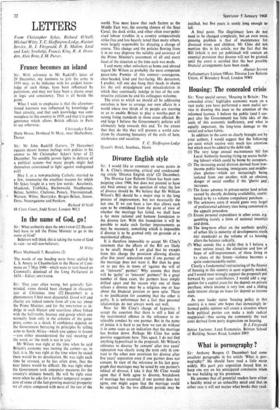Divorce English style
Sir: I would like to comment on some points in R. A. Cline's interesting; critical and condescend- ing article 'Divorce English style (22 December).
The Divorce Law Reform Union has been cam- paigning since 1906, but does• not pretend to have any final answer to the question of- what the law of divorce should be. We believe that Mr William Wilson's Bill should be a major step in, the long process of improvement, but not necessarily the last one. If we can have a law. that allows each case to be considered from the point of view of whether the marriage has failed, we shall have a far more rational and humane foundation to the divorce law. With this foundation it will be possible to make such further improvements as may be necessary, something which -is impossible if divorce is to be granted only on grounds of a matrimonial offence.
It is therefore impossible to accept Mr Cline's statement that the effects of the Bill are likely to be small; all; though I am glad that he excepts from this charge the provision allowing divoree after five years' separation even if one partner of the marriage does not want it. But then he goes on to put this in terms of 'against the will of an "innocent" partner.' Why assume that there will be 'guilty' or 'innocent' partners? In a great number of these cases, the partners have simply drifted apart and the reason why one of them refuses a divorce may be a religious one or fear about the financial position or pure spite. There is no justification for assuming that the other is guilty. It is unfortunate but a fact that personal relationships do not always work out well. - Now for Mr Cline's charge of hypoerisy. I accept the assertion that there is still a hint of the matrimonial offence in the reference to in- tolerable conduct by one partner. But in the name of justice it is hard to see how we can do without it in some cases as an indication that the marriage has broken down. Perhaps Mr Cline has some positive suggestions here. This apart, I do not find anything hypocritical in the proposals. Mr Wilson's reference to divorce `by consent' after two years' separation was clearly using the term only in con- trast to the other new provision for divorce after five years' separation even if one partner does not consent. In view of the inference in his last para- graph that marriages may be saved by one partner's refusal of divorce, I take it that Mr Cline would agree that if both agree to divorce, breakdown of marriage has occurred; if one partner does not agree, one might argue that the marriage could be repaired. So the two different periods may be
justified, but five years is surely long enough to tell.
A final point. The illegitimacy laws do not need to be changed completely, but an even more; pressing problem is that of maintenance for divorced wives and children. Mr Cline did not mention this in his article, nor the fact that the Bill (which is not yet published) will contain an, essential provision' that divorce will not be granted, until the court is satisfied that the best possible financial arrangements have been made.
Alastair Service Parliamentary Liaison Officer, Divorce Law Reform Union, 47 Boundary Road, London NW8


































 Previous page
Previous page